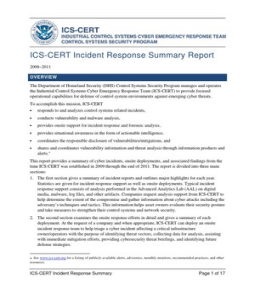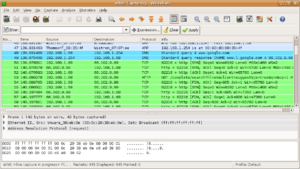Here are some knowledge areas which I consider necessary to conduct effective intrusion analysis and operations. In future articles I will go into further details on how to improve your skills in each of these areas (and link them from here). The knowledge areas are not listed in any particular order.
Every organization’s mission, focus, and needs are different and therefore I don’t pretend to define the ‘perfect’ analyst for any mission.
Critical Thinking and Logic
I will be forthright and say that I consider this skill the most important above all others. It is a gateway skill which allows an analyst to become proficient in many others. It is also the skill upon which I rely for analysts to temper their judgments and make the best decision as to how to approach a problem. Logic is complementary to critical thinking and the two cannot be separated. Without a proper foundation in logic critical thinking is ineffective.

US-CERT Incident Reponse Report
Critical Reading and Writing
Critical reading is being able to dissect the text of a document to extract the most important information and apply critical thinking skills to the information.Effective/Critical writing and documentation refers to writing correctly, logically, concisely, and effectively for your audience (which likely includes yourself). Most importantly, write in an organized manner to help others use their critical thinking skills.
History
As I have said previously: “Study History. It provides perspective.” Works like The Cuckoos Egg are a great start; but branch into other areas: military history, biographies of famous leaders, studies of famous events. Learn how others have been able to assess strategic situations, derive tactics, and evolve their strategy to a quickly changing situation. All of these skills are useful in intrusion analysis and incident response. Be able to step back from a situation and apply the lessons learned from others to your own.
Research Methods
In the cyber security domain we face more unknown than knowns. My favorite saying is “no analyst is an island” meaning that there is nobody who knows it all and we need to rely on others and the greater community to help to solve problems. Therefore, a significant skill is the ability to conduct effective research on hard problems to find existing solutions – preventing, as the saying goes, “recreating the wheel.” This skill, more than any other, will increase your effectiveness and efficiency.
This skill can and should be mixed with other skills described – critical reading to get through research material quicker, critical thinking to see through the B.S. and FUD, and effective writing to document your findings so you use it again in the future.
Analytic Approaches and Methods
When facing any problem, being able to identify and evaluate the various approaches to solving the problem is invaluable – some would say critical. Being knowledgeable in as many analytic approaches as possible is invaluable, and being able to create new approaches on-the-fly is even more invaluable.
Learn analytic methods from others. Look for their mixture of logic, research, tool use, and lines of critical thinking and apply them yourself.
Network Protocol Analysis
Know your network protocols. More importantly, be able to research, analyze, and identify new or previously unknown protocols. Don’t be afraid of packets. Use your research methods and critical reading skills to dissect protocol definitions and RFCs.
Programming
A basic knowledge and ability to write computer programs is very useful in that it practices logic skills, helps one better dissect cyber security activities, and allows one to create and/or modify tools quickly as necessary.
Psychology
An understanding of the fundamental theorems of psychology is useful when attempting to determine the intent, context, and motivations of an adversary. For example, knowing and being able to apply the fundamentals of Maslow’s Hierarchy of Needs or Operant Conditioning will go towards influencing your adversary through operations to achieve a positive outcome and better protect your network.
See Also: A Hacker’s Hierarchy of Operational Needs based on Maslow’s Theory of Human Motivation
Hacker Tools and Methodology
Obviously, a working knowledge of hacker tools and methodologies is a must.
Binary Reverse Engineering

IDA Pro Binary Reverse Engineering
All hackers use capabilities and tools to achieve their desired effects. Most of these are binaries either live on command-and-control nodes or are delivered to the target for operations. Having a working knowledge and ability to reverse engineer a binary is necessary to conducting effective analysis Even if your organization has dedicated reverse engineers having this knowledge to effectively communicate and ask intelligent questions of these engineers is just as important.
Host-Based Log File and Forensic Analysis
Understanding the internal workings of a host and operating system help not only in investigations where host data is available but also as a learning tool to understand the adversary’s target environment. This will further inform the analyst by providing greater context to the choices of an adversary given the host environment.
This knowledge should be coupled with that of hacker tools and methodologies and network and host configuration and administration for full effect.
Network and Host Configuration and Administration
As I’ve said in another post, 5 Intrusion Analysis Ideas in 10 Minutes, I believe that cyber security professional should be just as proficient in understanding how networks and hosts are administrated and configured as in how those systems are attacked.
Signature Writing and Detection Tools

Example Snort Rule
Finding malicious activity on your network is important, being able to track that activity and detect when it returns is an imperative. Therefore, analysts and operators should be proficient in their organization’s particular signature and detection tools and learn how to author the best signatures.
It is just as important to understand how a detection tool works but also it’s biases and limitations – so you know when there are potential false positives and false negatives. This is one of my 20 Questions for an Intrusion Analyst.
Incident Response Methodology
Incident response methodology is obviously a requirement for anybody who is part of the incident response team in their organization. However, incident response should be well-known by every intrusion analyst. This is simply because they will likely be generating documentation and analysis for the incident response team. The better they understand the methodology, the better they can tailor their documentation and feedback to the needs of response and mitigation.
Tools

Wireshark
I am fond of saying, “there is no one tool to rule them all,” meaning no single tool will do everything you need. While I think that too much time is spent by cyber security professionals in becoming proficient in a specific tool-set, I cannot under estimate the criticality of these tools to our profession. However, I believe that over reliance on our tools breeds ignorance of the data the tool is processing and analysts become unwilling to challenge and blindly trusting the output.
Therefore, it is important to know how to operate and understand the tools that are best for your mission be it OllyDbg or Wireshark.
Lastly, with a strong or competent programming background, as described previously, you are empowered to write your own tools or improve existing tools for the benefit of the community.



